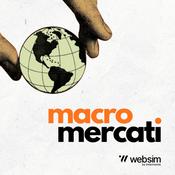94 episodi
- If you spend any time on the water, you’ve probably heard the joke that the two best days of a boat owner’s life are the day they buy the boat… and the day they sell it.
For today’s guest, that line isn’t just a joke. It’s a problem statement.
Mitch Lee grew up around boats. He loved being on the water, but he also experienced firsthand how loud, smelly, maintenance-heavy, and frustrating boat ownership can be. And once electric vehicles started proving what was possible on land, one idea kept coming back to him: if electrification makes sense in cars on the road, it might actually make even more sense in boats on the water.
Mitch is the co-founder and CEO of Arc, an electric boat company building both consumer and commercial vessels. Arc started in the premium wake sports market, selling directly to consumers and using those early boats to develop its electric propulsion technology. That platform is now being deployed in commercial applications, where electrification can improve reliability, lower costs, and support ports that want to electrify.
Founded in 2021, Arc has raised over $110 million through its Series B and has scaled from delivering its first customer boat, which took two years to build, to now producing multiple boats per week, while also landing major commercial partnerships at working ports.
In our conversation, Mitch walks me through his path that led to Arc, from a childhood fascination with stocks and compounding interest, to building and selling his first company in the personal finance space, to betting big on electric boats and what electrification can unlock on the water.
About Powerhouse Innovation and Powerhouse Ventures
Powerhouse Ventures backs seed stage startups developing innovative software to advance clean energy, mobility, and industry. If you are thinking about building something in this space, get in touch with our team.
Powerhouse Innovation is a best in class consulting firm, powered by the strongest energy innovation network, data and team in our industry. We partner with world's leading corporations, investors, and utilities to source and evaluate disruptive startups shaping the future of energy and industry.
To hear more stories of founders building our energy abundant future, hit the “subscribe” button and leave us a review. - As an aging grid faces rising demand, increasing complexity, and more frequent stress events, one thing has become clear: we don’t just need more power, we need power that can show up at the right time, in the right place, and at the right price. What’s far less settled is how we get there. Should large energy users build their own power? Should they treat the grid as something to work around rather than work with? Or is there a way for new load to actively strengthen the grid by contributing capacity when it’s needed most?
This moment is being shaped by real market signals. Just two weeks ago, PJM, the largest power market in the U.S., cleared its latest capacity auction at the market cap yet again, underscoring how tight supply has become and how quickly affordability pressures are building. As data center demand accelerates, those pressures are no longer abstract, they’re showing up in prices, planning decisions, and who ultimately pays.
These questions have been a throughline for us this year on Watt It Takes. We’ve talked with founders working across the grid, from storage and interconnection to transmission and large-scale development. Today’s conversation brings many of those threads together.
Dana Guernsey and her team at Voltus are tackling that challenge at the intersection of demand and supply, turning customer-side flexibility into dependable grid capacity. Voltus sits between energy users and grid operators, aggregating flexible demand from sources like demand response, EV charging, batteries, and onsite generation, and translating it into dispatchable capacity that markets value and pay for. Voltus’s business model is a value-share: the company monetizes that flexibility in energy markets and shares the resulting value with the customers providing it.
Voltus operates across all major North American power markets, even in an industry where each ISO and RTO plays by different rules. Today, the company manages more than eight gigawatts of flexible capacity and supports tens of thousands of customer sites, with resources dispatched thousands of times each year.
On this last episode of the year, I spoke with Dana Guernsey, Co-Founder and CEO of Voltus. We talked about her journey, from growing up in Queens, New York and coming of age around 9/11, to discovering energy markets during her time at EnerNOC, to founding Voltus while starting a family. That path shaped how Dana thinks about complexity, customers, and reliability, and ultimately led her to build Voltus into a platform designed to help make clean, affordable, and reliable power something we don’t have to trade off against growth.
About Powerhouse Innovation and Powerhouse Ventures
Powerhouse Ventures backs seed stage startups developing innovative software to advance clean energy, mobility, and industry. If you are thinking about building something in this space, get in touch with our team.
Powerhouse Innovation is a best in class consulting firm, powered by the strongest energy innovation network, data and team in our industry. We partner with world's leading corporations, investors, and utilities to source and evaluate disruptive startups shaping the future of energy and industry.
To hear more stories of founders building our energy abundant future, hit the “subscribe” button and leave us a review. - As load growth pushes the grid to its limits, the energy transition increasingly depends on one technology: storage. Batteries are becoming the backbone of reliable, clean power, and according to a recent UBS analysis, AI-driven data centers are set to trigger a “boom cycle” for energy storage in the next five years.
As more clean energy comes online and global energy demand surges, batteries are proving essential to a flexible and resilient grid. But operating them is complex. Unlike wind or solar projects driven by long-term contracts, storage assets must constantly make decisions about when to charge and discharge, how to capture value across multiple markets, and how to stay profitable in an increasingly volatile energy system.
Michael Baker, Co-Founder and CEO of Tyba, is working at the center of this shift. His team builds the software that helps batteries make smarter decisions in real time, turning storage into a reliable and profitable part of the grid. Powerhouse Ventures is fortunate to be an early investor in Tyba, first backing them in their seed round in January 2023.
About Powerhouse Innovation and Powerhouse Ventures
Powerhouse Ventures backs seed stage startups developing innovative software to advance clean energy, mobility, and industry. If you are thinking about building something in this space, get in touch with our team.
Powerhouse Innovation is a best in class consulting firm, powered by the strongest energy innovation network, data and team in our industry. We partner with world's leading corporations, investors, and utilities to source and evaluate disruptive startups shaping the future of energy and industry.
To hear more stories of founders building our energy abundant future, hit the “subscribe” button and leave us a review. - At a moment when our country can feel deeply divided, and when progress on clean energy can feel uncertain, this month's guest — former U.S. Secretary of Energy and two-term Governor of Michigan, Jennifer Granholm — couldn’t be timelier.
It was the perfect moment to take stock of where we are as an industry. After years of historic progress, we’re now facing growing uncertainty about what comes next. The optimism that followed the passage of the Inflation Reduction Act, the Bipartisan Infrastructure Law, and the CHIPS and Science Act can feel harder to access — and yet gatherings like this live recording and New Dawn, our thousand-person sold-out annual party hosted the following evening, remind us how far we’ve come and how powerful it is when this community comes together.
Special thanks to this year’s New Dawn Terawatt sponsors, Silicon Valley Bank and Wilson Sonsini, for helping make gatherings like these possible.
For me, this interview was personal — and a bit of a full-circle moment. I’ve admired Governor Granholm for years. We first met over a decade ago, when she served as a judge for one of Powerhouse’s early hackathons, and even then, her conviction and optimism left a lasting impression.
Her legacy in public service is one of transformation — from rebuilding Michigan’s economy to reshaping the Department of Energy’s role in accelerating the clean energy transition. At DOE, Granholm led an unprecedented expansion of clean energy deployment and manufacturing, rebuilding supply chains, creating jobs, and helping position the United States as a global leader in the energy transition.
In a moment when federal leadership can feel disconnected from what our country truly needs for clean, abundant energy and lasting progress, Governor Granholm is a reminder of what grounded, forward-thinking, and empathetic leadership can achieve. I hope you enjoy this conversation as much as I did.
About Powerhouse Innovation and Powerhouse Ventures
Powerhouse Ventures backs seed stage startups developing innovative software to advance clean energy, mobility, and industry. If you are thinking about building something in this space, get in touch with our team.
Powerhouse Innovation is a best in class consulting firm, powered by the strongest energy innovation network, data and team in our industry. We partner with world's leading corporations, investors, and utilities to source and evaluate disruptive startups shaping the future of energy and industry.
To hear more stories of founders building our energy abundant future, hit the “subscribe” button and leave us a review. - As we’ve covered in other recent episodes, the growth of data centers and the massive amount of power they require is reshaping the energy landscape. Today, I want to zero in on a specific challenge at the heart of it all: the watt bit spread, a phrase coined by this month’s guest.
The Watt Bit Spread is the gap between the cost of electricity and the value of computing—computing meaning, the processing power behind AI, cloud services, and digital infrastructure. Bridging that gap is one of the keys to unlocking both data center growth and new power generation.
Despite countless developers' promises of abundant “powered land,” very few can deliver what data centers and other energy-intensive industries actually need. It’s not just certainty of power timelines but also land, utility agreements, capital, and community support — all critical to reducing the constraints that make the watt bit spread so persistent. Too often, there’s a disconnect between real estate and utilities. Some companies know how to acquire land. Others know how to work with utilities. But rarely both. And even when those pieces come together, projects can still be stalled without community support, labor, or equipment.
That’s where Brian Janous, Co-Founder and CCO of Cloverleaf Infrastructure, comes in—working to bridge the watt bit spread by aligning land, power, and communities to meet the surging demand for computing. Put simply, Cloverleaf buys land in dollars per acre and sells it in dollars per megawatt.
Sponsors
Watt It Takes is brought to you by HSBC Innovation Banking who is proud to bank some of the most exciting companies pioneering the technologies of tomorrow.
With specialist financing support, deep understanding of the challenges, and a global network across more than 50 markets, they help clients scale breakthrough innovations and take them to the world. Infinium are a leader in ultra-low carbon synthetic eFuels and offer comprehensive energy system solutions to support the rapidly evolving energy industry. HSBC Innovation Banking have supported Infinium with project financing to scale their latest commercial-scale project, which on completion will be the largest eFuels project in the world.
So, if you’re looking for early-stage funding, or well on your way to FOAK, click the link in the call notes to learn how HSBC Innovation Banking can help on the next stage of your journey.
HSBC Innovation Banking is a business division with services provided in the United States by HSBC Bank USA, N.A.
https://www.business.us.hsbc.com/en/innovation-banking-powerhouse-innovation
About Powerhouse Innovation and Powerhouse Ventures
Powerhouse Innovation is a leading consulting firm connecting top-tier corporations and investors, including corporate innovation teams, CVCs, and pensions with cutting-edge technologies and startups that meet their specific criteria for engagement.
Powerhouse Ventures backs entrepreneurs building the digital infrastructure for rapid decarbonization. To hear more stories of founders building our energy abundant future, hit the “subscribe” button and leave us a review.
Altri podcast di Economia
Podcast di tendenza in Economia
Su Watt It Takes
Our monthly podcast tells the stories of founders who are building our clean energy abundant future—their upbringings, their risks, their failures, and their breakthroughs that are transforming our world. Subscribe on Spotify or Apple to stay up to date with the latest episodes.
Sito web del podcastAscolta Watt It Takes, Chapeau e molti altri podcast da tutto il mondo con l’applicazione di radio.it

Scarica l'app gratuita radio.it
- Salva le radio e i podcast favoriti
- Streaming via Wi-Fi o Bluetooth
- Supporta Carplay & Android Auto
- Molte altre funzioni dell'app
Scarica l'app gratuita radio.it
- Salva le radio e i podcast favoriti
- Streaming via Wi-Fi o Bluetooth
- Supporta Carplay & Android Auto
- Molte altre funzioni dell'app


Watt It Takes
Scansione il codice,
scarica l'app,
ascolta.
scarica l'app,
ascolta.









































